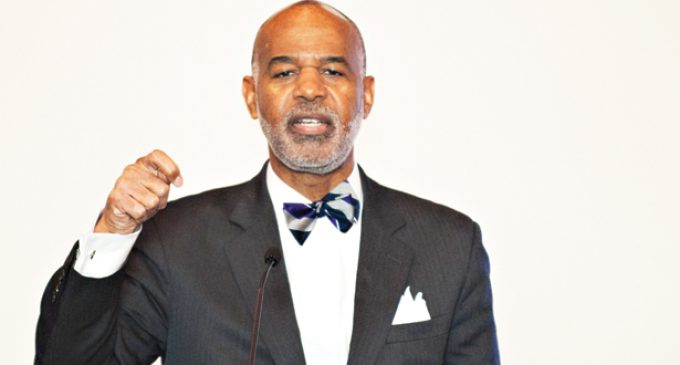Appeals court judge urges law students to ‘go against the grain’

(Above: Robert Ross Photography, Wake Forest Law– Judge Roger Gregory speaks.)
“It’s so important that young lawyers understand what justice is and how to go about making it possible for everyone,” said Judge Roger Gregory of the U.S. Court of Appeals for the Fourth Circuit.
He was the keynote speaker at the Wake Forest University Black Law Students Association’s (BLSA) 30th annual Scholarship Banquet on Friday, Feb. 13, at the Milton Rhodes Center for the Arts.
Gregory joined the court in 2001 after being nominated by former President Bill Clinton, and re-nominated to the seat by President George W. Bush. He received his bachelor’s from Virginia State University before receiving his law degree from Michigan Law School in 1978.
Gregory was the first judge nominated to the Fourth Circuit by Bush. He is also the first black judge to serve on the Fourth Circuit.
In 2014, he joined the majority opinion with Henry Franklin Floyd in the historic Bostic v. Schaefer case that declared Virginia’s ban on same-sex marriage unconstitutional. That decision led to the legalization of same-sex marriage in Virginia and other states in the Fourth Circuit, which is based in Richmond, Virginia.
The U.S. Court of Appeals for the Fourth Circuit hears appeals from the district courts in the states of Maryland, North Carolina, South Carolina, Virginia and West Virginia. There are nine federal district courts located within the Fourth Circuit.
Gregory charged students and professionals to remember that it’s not about where your ticket is, but where you’re going.
“Is your ticket punched? We have to ask the question ‘where are you going?,’” he said. “Young people don’t waste your time. We don’t know how many days we have, but we do know this day, and we have a responsibility everyday when you are in your classes, when you talk to each other and you are working on this thing called law, get the deepest understanding that you can.”
He said just being a lawyer doesn’t mean you are on the side of justice but it takes effort, courage and commitment, along with an understanding and willingness to work hard. He also told the young lawyers to become a genius in their fields, posing new questions to help improve society and the industry.
“I want you to go against the grain. I want you to be the type of lawyer that when someone says it can’t be done, you say, ‘Let me take a look at that.’ Take that chance to look. I want you to be the type of lawyer that will stand tall,” Gregory said.
The event was organized by BLSA Vice President Ariana Burnette, who said that the banquet was successful.
“I’ve heard nothing but great feedback,” she said. “Walking through the halls, a lot of professors and students said that it was one of the best banquets they’ve attended.”
Three students were awarded scholarship monies from the organization: Correll Kennedy (class of 2017), Cheslie Kryst (class of 2016) and Nabila Abdulhafiz (class of 2015). The scholarships were presented by Judge Denise S. Hartsfield. A representative from BLSA said that they would prefer not to disclose the scholarship amounts.
The BLSA Legacy Award was presented to Tracey Banks Coan, associate law professor and assistant dean for Academic Engagement. Student members vote to recognize faculty members that have been dedicated and very involved in BLSA.
“Everybody who takes her class understands how passionate Dean Coan is about making sure that you actually understand the information and making sure you actually learn it. She means a lot to the students,” Burnette said.
At the banquet, David H. Wagner Jr. was recognized, along with Terry Hart Lee. Wagner was one of the first black students to graduate from Wake Forest Law, and consistently demonstrated his commitment to education and the community as a principal and business owner. The university and the family are in talks to do something that will honor his memory and allow his legacy to continue among Wake Forest Law students.
Lee was the first female black law student to graduate from the university. She founded the BLSA chapter at Wake Forest and worked in governmental law across the nation.
The National Black Law Students Association was founded in 1968 by in an effort to articulate and promote the needs and goals of black law students and effectuate change in the legal community. The Wake Forest chapter of the BLSA is a local organization of law students affiliated with the regional and national BLSA organizations.
BLSA sponsors a scholarship banquet each year to fund merit-based scholarships that are given to one BLSA student-member in each class. Students eligible for the scholarship must be dues-paying members in their first, second or third year as a law student.
They must have met the required service hours, both pro bono and community service, to apply for the scholarship.










